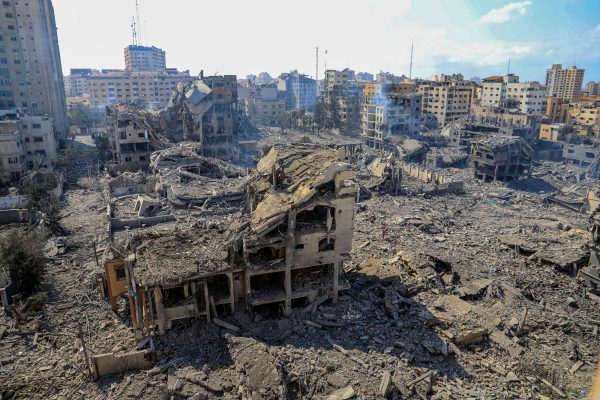As conflict escalates in the Middle East, particularly between Israel and Iran-backed Hezbollah, the region is on the brink of a full-scale conflict. Israel has launched a ground offensive in Lebanon, targeting Hezbollah, and Iran retaliated by sending nearly 200 ballistic missiles toward Israel.
During this precarious time, China has taken important diplomatic steps to support its long-standing ties with Iran. A meeting between Chinese Foreign Minister Wang Yi and Iran’s recently elected reformist President Masoud Pezeshkian took place on the sidelines of the United Nations General Assembly. Later, Beijing reiterated its opposition to foreign interference and support for Iran’s sovereignty.
“On the issue of the Israel-Palestine conflict, China will continue to uphold justice, pushing for a ceasefire and an end to the war,” CGTN cited Wang as telling Pezeshkian.
China’s diplomacy with Iran is a critical development as Beijing tries to protect its own strategic interests while handling the intricate dynamics of Middle Eastern geopolitics.
China’s engagement in the Middle East is motivated by three interconnected interests: energy security, economic investments, and political influence. China, being the world’s largest importer of oil, mostly relies on Saudi Arabia and Iran to meet its energy demands. Beijing thus has a compelling interest in stability in the region, which is frequently embroiled in armed and political crises that threaten global oil supplies.
In addition, the majority of Chinese BRI investment projects in 2021, according to the China BRI Investment Report, were concentrated in the Middle East and North Africa (MENA) region. Furthermore, these nations got $15.8 billion, or 36.7 percent of the entire BRI construction commitments, in 2023.
The China-Iran relationship in particular has developed from pragmatic cooperation to a strategic partnership that supports the political and economic interests of both nations since the Iran-Iraq War. Tehran gains economic relief and diplomatic backing despite U.S. sanctions, while Beijing benefits from Iran’s pivotal role in its Belt and Road Initiative. Together, they challenge U.S. influence in the Middle East, strengthening their geopolitical positions.
International sanctions against Iran have not deterred China from supporting Tehran. During the meeting with Pezeshkian, Wang emphasized China’s opposition to unilateral sanctions and foreign interference, bolstering Beijing’s self-positioning as a global power that supports developing countries against external pressures. This stance also enables China to protect its major economic interests in Iran, particularly in infrastructure and energy, which may be limited by sanctions.
China has positioned itself as a neutral actor in Middle Eastern affairs, carefully managing relations with the region’s major countries. Beijing steers clear of directly challenging Israel, despite its policies. China has made significant investments in Israel, particularly tied to the Belt and Road Initiative. As a Chinese analyst noted in a 2023 analysis for The Diplomat, “According to IISS’ China Connects database, China has invested in more Belt and Road Initiative (BRI) and ‘BRI-like’ projects in Israel than in any other regional country.” China is particularly interested in acquiring Israeli tech companies, symbolized by a $300 million bid by a Chinese company to buy Israel’s Color Chip. However, pressure from the United States has pushed Israel to tighten restrictions on such deals.
Beijing clearly values its diplomatic and trade relations with Israel. However, China also takes a firm stance on Palestine, insisting on a two-state solution, and has strong ties with Iran, Israel’s greatest enemy. China manages this delicate relationship by supporting Iran while maintaining close economic and political ties with Israel and other Middle Eastern states. This diplomatic balancing act allows China to extend its influence across the region without becoming embroiled in conflicts in the same way Western powers often do. By portraying itself as a neutral actor, China can retain diplomatic and economic connections with both Israel and Iran while balancing its regional interests and influence.
The escalation underway in the Israel-Palestine and Israel-Lebanon conflicts is making China’s balancing act more difficult. Following an Israeli strike on Beirut that killed Hezbollah leader Hassan Nasrallah, China’s Foreign Ministry expressed that any breach of Lebanon’s sovereignty would be unacceptable. The ministry urged all sides, including Israel, to de-escalate tensions and keep the crisis from worsening or spiraling out of control. Nasrallah’s death was a big setback for Iran-aligned Hezbollah amid Israeli attacks.
China’s reaction to the Israel-Gaza conflict more broadly has emphasized moderation, an early ceasefire, and civilian safety. Beijing has continuously maintained that a two-state solution is the only way to end the Israeli-Palestinian conflict and achieve long-term peace. However, China has attracted criticism from Israel for failing to classify the October 7 attack by Hamas as a terrorist act, likely because of Beijing’s close links with Iran, a firm supporter of Hamas. Instead, China has denounced activities that harm civilians, usually without specifying which actions taken by which party it is condemning.
China’s stance amid the current conflict is consistent with its broader diplomatic approach, which seeks to protect its strategic interests while encouraging regional stability. But by maintaining its backing for Tehran as tensions escalate, Beijing may be gently changing the regional power dynamic.
China maintains deep strategic and economic links with both Iran and Israel, but the risk of open hostility between the two countries might place Beijing in a difficult position. Relations with Israel – already under tensions from China-U.S. competition – are now further strained by China’s refusal to publicly condemn organizations such as Hezbollah, especially as Israeli security concerns develop. Furthermore, if Beijing is perceived to be leaning too close to Tehran, its partnerships with Arab states, who are wary of Iran’s influence, may be put at risk.
The possible disruption of China’s BRI projects, which include both Iran and Israel, is another challenge. China’s wider economic objectives may be jeopardized and these infrastructure investments put at risk by the region’s escalating violence and instability. Furthermore, China’s energy security could be directly threatened by any disruption in regional security, given its continued reliance on Middle Eastern oil, especially from Saudi Arabia and Iran.
As conflict escalates between major regional actors including Israel, Hamas, Lebanon and Iran, China’s diplomatic balancing in the Middle East is facing more and more challenges. Moving forward, China could use its connection with Iran to assist de-escalate tensions between Israel and Iran-backed militants in Lebanon, therefore preventing a larger regional conflict. However, taking an active role in conflict mediation will bring unprecedented challenges to China’s balancing act between the major poles of influence in the Middle East. China’s capacity to maintain its neutral posture and serve as a stabilizing influence in the region will come under more and more pressure as it navigates these complicated dynamics.




